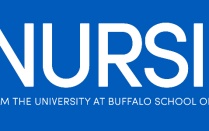UB SON: Navigating COVID-19 to Ensure the Safety and Success of Our University Community

Faculty and staff worked to create physically distanced classrooms for Fall 2020 and require all students and faculty to wear face coverings.
Since the university transitioned to a distance model during the spring 2020 semester, UB School of Nursing faculty and staff diligently mobilized to provide our students with the best possible education with safety being paramount. Our COVID-19 Response Team, comprised of 14 faculty and staff leaders, met daily beginning in March to oversee the transition to totally distance learning. Faculty and staff were creative and innovative in developing classroom and virtual simulation opportunities to temporarily replace face-to-face experiences.
While we had to rapidly adjust to a remote work model, our advanced technology resources ensured that the School of Nursing continued to serve our students. When students virtually returned to classes after spring break, they were able to continue their coursework without missing a beat.
This summer, collaboration within the SON and with UB senior leadership and the Environment, Health and Safety department enabled us to provide safe in-person learning for our ABS students in the laboratory and simulation center in preparation for their clinical practicum experiences. Our plan is coordinated by Robert Cenczyk, our director of academic operations, and SON IT, Educational Technology, Business, Student Services, Center for Nursing Research and Communications offices, along with faculty leaders.
We identified our needs for personal protective equipment and acquired the needed equipment; ensured that Wende and Beck Halls were safe places with available safety measures, such as cleaning supplies and proper signage; and exercised vigilance in reminding students to wear face coverings, stay physically distanced, use proper handwashing techniques and complete their daily health checks. We began to bring faculty and staff back to the SON when it was necessary and they felt comfortable while maintaining established capacity limitations. Our COVID-19 Response Team established a plan for a safe fall semester return, which was approved before classes began August 31.
Throughout this crisis, faculty and staff have been meeting daily to address concerns related to clinical hours, exams and course delivery in order to help students successfully complete their program in the most effective manner possible under these extraordinary circumstances.
While we’re certainly committed to our students’ academic success, we’re equally devoted to their physical health and mental well-being. Broadly, we’re connecting our community to counseling services and crisis resources and sharing tips for managing stress and anxiety. Individually, our faculty and staff members are ensuring that no student concern goes unaddressed.
On the university level, our students and faculty have engaged to assist in UB’s safe return to campus. As nurses and future nurses, our students answered the call to assist in the University’s randomized surveillance testing, with the Environment, Health and Safety department lauding them as great communicators who assisted over 150 students through the testing process on the first day of testing. Nursing students and faculty will continue to assist in surveillance testing as needed.
SON researchers have also turned their focus to the many health issues that have emerged during the pandemic, resulting in the school’s first Patient-Centered Outcomes Research Institute (PCORI) award of $2.5 million. With Associate Dean for Research and Scholarship Yu-Ping Chang at the helm, along with a strong cohort of co-investigators, including School of Nursing researchers Christopher Barrick, Susan Grinslade, Rebecca Lorenz, Loralee Sessanna, Patricia Nisbet and Chin-Shang Li, as well as Wenyao Xu from UB's Department of Computer Science and Engineering, the team seeks to help adults living in low-income, racial- and ethnic-minority neighborhoods reduce stress due to the COVID-19 pandemic.
As we navigate the uncharted waters in which we find ourselves, we remain committed to the health, safety and success of our students, our school, our community and our nation.
Past Issues
We want to hear from our incredible alumni. Whether you live in Western New York or anywhere else in the world, stay in touch! Send us a class note.

